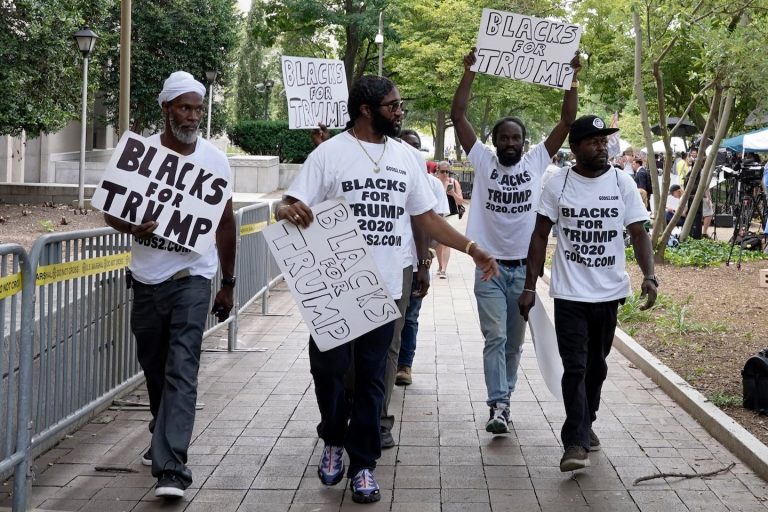“[Democrats] ran a race to the right, and in order to do that, we had to be silent on a lot of issues that we work on daily, that people find passion in,” such as police reform, said Malia Lazu, a longtime community organizer and founder and CEO of The Lazu Group. “This is a time to be honest about where we are because we could be moving in the wrong direction.”
To be sure, Black voters supported Vice President Kamala Harris more than any other racial voting bloc, according to exit polls. However, since 2016, the percentage of Black voters nationally backing Trump has risen from 8 percent to 13 percent this year, according to CNN exit poll data. The increase is more pronounced among Black men, 21 percent of whom voted for Trump this year, a roughly eight-percentage-point jump from 2016. Trump’s support among Black voters ages 18 to 64 has grown steadily, too.
In 10 Massachusetts towns with the highest share of Black residents, Trump gained 5.8 percentage points on average compared to 2020, a Globe analysis of census and election data found. That’s in comparison to an average of about 4 percent statewide.
In Brockton, where two in five residents are Black, Trump improved to 27.6 percent of the vote, from 22.3 percent in 2020.
In Springfield, where one in five residents are Black, Trump earned 32.2 percent of the vote, compared to 24.9 percent in 2020.
The gradual increase in Trump support has some Black leaders in Boston concerned that some community members have pinned their vote on one issue without realizing the potential consequences.
“Sometimes, it’s going to take people seeing the actual harms of policy implementation” to realize the magnitude of their vote, said the Rev. Rahsaan D. Hall, president and CEO of the Urban League of Eastern Massachusetts. “As an individual, you may not have been harmed [by Trump’s proposals], but what about the broader community?”
The GOP ticket’s pull on the Black electorate in recent years has been minimal when compared to other demographics. For example, roughly half of Latinos — regardless of race — backed Harris this year, compared to 65 percent for Biden in 2020. With Asian voters, Trump’s support rose from 27 to 39 percent since 2016.
Black leaders who spoke with the Globe said they feel grateful to live in a blue state like Massachusetts, where abortion rights are protected, elected officials are prepared to combat mass deportation efforts, and policies are often written with an equity lens. Yet, as Imari Paris Jeffries of Embrace Boston puts it, a Democratic stronghold such as Massachusetts “isn’t waterproof” from the fallout of impending Trump policies.
In response, some of Boston’s Black, liberal leaders said they are ramping up their fights for immigrant rights, LGBTQ+ rights, women’s rights, and other marginalized groups, as well as bracing themselves for any opposition that might come at the federal level. And most importantly? They are recharging before inauguration day next year.
“Black people should rest and recover because we’ve had our backs against the wall before,” said Paris Jeffries, president and CEO of Embrace Boston. “The fight for justice continues.”
While local Black leaders reconsider the community’s future under a second Trump presidency, some Black voters say the president-elect was the better option to address the nation’s biggest challenges: American democracy, the economy, and immigration policy.
Brendan MiCHI, a tech employee, was one such Trump voter. He disagrees with the United States’ involvement in NATO, and said the nation is importing too many goods without exporting enough. As a small-business owner, he feels especially affected.
“I want this country to be in a better position to compete and retain most of our jobs,” he said. “A lot of our tech jobs are overseas, but a lot of them should be here.”
MiCHI emigrated from Nigeria to America in 1987 and is a registered Democrat. The Mattapan resident voted for President Biden in the last election. This year, he said he supported other Democrats and his neighbor State Representative Russell Holmes, too.
This time around, though, he said he couldn’t bring himself to support a Democrat as president, because “it’s all numbers for me.”
Wilnelia Rivera, a consultant who previously worked in former governor Deval Patrick’s administration and on US Representative Ayanna Pressley’s campaign team, said the shifting voting trends could also reflect the community’s evolving views on elections. Voters, the former political strategist said, have undergone one Trump term already, and a catastrophic pandemic that challenged our infrastructure. All of these life changes might have made some people in the community believe that elected officials won’t solve their issues and that their energy might be best used organizing on their own, she said.
“Some of us could hold that [frustration], be OK, and vote, but there’s a lot of people that couldn’t,” Rivera said.
Neena Hagen of the Globe staff contributed to this report.
Tiana Woodard can be reached at tiana.woodard@globe.com. Follow her @tianarochon.




